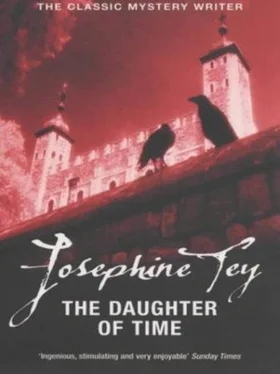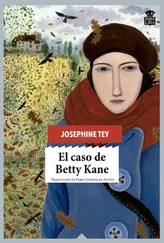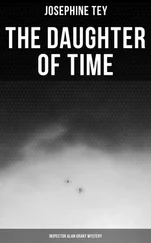‘Well, that is very nice and clear. And what is clearest of all is that, considering time and distances, the sainted More’s account of his writing sweet letters to the Queen to induce her to send only a small escort for the boy, is nonsense.’
‘Bunk.’
‘Indeed, Richard did just what one would expect him to do. He must of course have known the provisions of Edward’s will. What his actions suggest is just what one would expect them to suggest; his own sorrow and his care for the boy. A requiem mass and an oath of allegiance.’
‘Yes.’
‘Where does the break in this orthodox pattern come? I mean: in Richard’s behaviour.’
‘Oh, not for a long time. When he arrived in London he found that the Queen, the younger boy, the daughters, and her first-marriage son, Dorset, had all bolted into sanctuary at Westminster. But apart from that things seem to have been normal.’
‘Did he take the boy to the Tower?’
Carradine riffled through his notes. ‘I don’t remember. Perhaps I didn’t get that. I was only – Oh, yes, here it is. No, he took the boy to the Bishop’s Palace in St Paul’s Churchyard, and he himself went to stay with his mother at Baynard’s Castle. Do you know where that was? I don’t.’
‘Yes. It was the Yorks’ town house. It stood on the bank of the river just a little way west of St Paul’s.’
‘Oh. Well, he stayed there until June the 5th, when his wife arrived from the North and they went to stay in a house called Crosby Place.’
‘It is still called Crosby Place. It has been moved to Chelsea, and the window Richard put into it may not still be there – I haven’t seen it lately – but the building is there.’
‘It is?’ Carradine said, delighted. ‘I’ll go and see it right away. It’s a very domestic tale when you think of it, isn’t it. Staying with his mother until his wife gets to town, and then moving in with her. Was Crosby Place theirs, then?’
‘Richard had leased it, I think. It belonged to one of the Aldermen of London. So there is no suggestion of opposition to his Protectorship, or of change of plans, when he arrived in London.’
‘Oh, no. He was acknowledged Protector before he ever arrived in London.’
‘How do you know that?’
‘In the Patent Rolls he is called Protector on two occasions – let me see – April 21st (that’s less than a fortnight after Edward’s death) and May the 2nd (that’s two days before he arrived in London at all.)’
‘All right; I’m sold. And no fuss? No hint of trouble?’
‘Not that I can find. On the 5th of June he gave detailed orders for the boy’s coronation on the 22nd. He even had letters of summons sent out to the forty squires who would be made knights of the Bath. It seems it was the custom for the King to knight them on the occasion of his coronation.’
‘The 5th,’ Grant said musingly. ‘And he fixed the coronation for the 22nd. He wasn’t leaving himself much time for a switch-over.’
‘No. There’s even a record of the order for the boy’s coronation clothes.’
‘And then what?’
‘Well,’ Carradine said, apologetic, ‘that’s as far as I’ve got. Something happened at a Council – on the 8th of June, I think – but the contemporary account is in the Mémoires of Philippe de Comines and I haven’t been able to get hold of a copy so far. But someone has promised to let me see a copy of Mandrot’s 1901 printing of it tomorrow. It seems that the Bishop of Bath broke some news to the Council on June the 8th. Do you know the Bishop of Bath? His name was Stillington.’
‘Never heard of him.’
‘He was a Fellow of All Souls, whatever that is, and a Canon of York, whatever that may be.’
‘Both learned and respectable, it appears.’
‘Well, we’ll see.’
‘Have you turned up any contemporary historians – other than Comines?’
‘Not any, so far, who wrote before Richard’s death. Comines has a French bias but not a Tudor one, so he’s more trustworthy than an Englishman writing about Richard under the Tudors would be. But I’ve got a lovely sample for you of how history is made. I found it when I was looking up the contemporary writers. You know that one of the things they tell about Richard III is that he killed Henry VI’s only son in cold blood after the battle of Tewkesbury? Well, believe it or not, that story is made up out of whole cloth. You can trace it from the very time it was first told. It’s the perfect answer to people who say there’s no smoke without fire. Believe me this smoke was made by rubbing two pieces of dry stick together.’
‘But Richard was just a boy at the time of Tewkesbury.’
‘He was eighteen, I think. And a very bonny fighter by all contemporary accounts. They were the same age, Henry’s son and Richard. Well, all the contemporary accounts, of whatever complexion, are unanimous in saying that he was killed during the battle. Then the fun begins.’
Carradine fluttered through his notes impatiently.
‘Goldarn it, what did I do with it? Ah. Here we are. Now. Fabyan, writing for Henry VII, says that the boy was captured and brought before Richard IV, was struck in the face by Edward with his gauntlet and immediately slain by the King’s servants. Nice? But Polydore Virgil goes one better. He says that the murder was done in person by George, Duke of Clarence, Richard, Duke of Gloucester, and William, Lord Hastings. Hall adds Dorset to the murderers. But that didn’t satisfy Holinshed: Holinshed reports that it was Richard Duke of Gloucester who struck the first blow. How do you like that? Best quality Tonypandy, isn’t it.’
‘Pure Tonypandy. A dramatic story with not a word of truth in it. If you can bear to listen to a few sentences of the sainted More, I’ll give you another sample of how history is made.’
‘The sainted More makes me sick at the stomach but I’ll listen.’
Grant looked for the paragraph he wanted, and read:
Some wise men also ween that his drift [that is, Richard’s drift] covertly conveyed, lacked not in helping forth his brother Clarence to his death; which he resisted openly, howbeit somewhat, as men deemed, more faintly than he that were heartily minded to his weal. And they who deem thus think that he, long time in King Edward’s life, forethought to be King in case that the King his brother (whose life he looked that evil diet should shorten) should happen to decease (as indeed he did) while his children were young. And they deem that for this intent he was glad of his brother Clarence’s death, whose life must needs have hindered him so intending whether the same Clarence had kept true to his nephew the young King or enterprised to be King himself. But of all this point there is no certainty, and whoso divineth upon conjectures may as well shoot too far as too short.
‘The mean, burbling, insinuating old dotard,’ said Carradine sweetly.
‘Were you clever enough to pick out the one positive statement in all that speculation?’
‘Oh, yes.’
‘You spotted it? That was smart of you. I had to read it three times before I got the one unqualified fact.’
‘That Richard protested openly against his brother George being put to death.’
‘Yes.’
‘Of course, with all that “men say” stuff,’ Carradine observed, ‘the impression that is left is just the opposite. I told you, I wouldn’t have the sainted More as a present.’
‘I think we ought to remember that it is John Morton’s account and not the sainted More’s.’
‘The sainted More sounds better. Besides, he liked the thing well enough to be copying it out.’
Grant, the one-time soldier, lay thinking of the expert handling of that very sticky situation at Northampton.
Читать дальше












